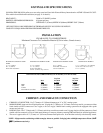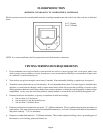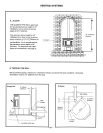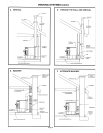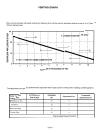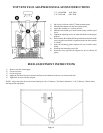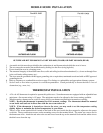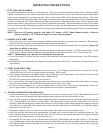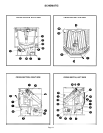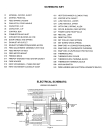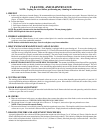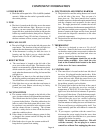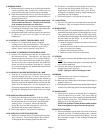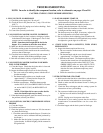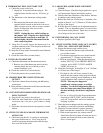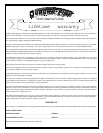8. THERMOSTAT WILL NOT START UNIT
A. Check the power to the stove.
1. Unplug for 10 seconds and then plug in. The
exhaust blower should come on. If it does, go
to B.
B. The thermostat or the thermostat wiring maybe
faulty.
1. Disconnect the thermostat wires from the
terminal block located on the back of the stove.
Make a jumper wire in order to create a manual
bypass to determine if the stove or the
thermostat is faulty.
NOTE: Unplug the stove while hooking up
the jumper wire. Plug the stove back in and
the unit should come back on and light. If
the unit lights, check the thermostat and the
wires connecting them.
C. Snap disc #2 would bypass the thermostat if an
overheat situation occurs. The snap disc should reset
itself once it cools down.
D. Snap disc #3 may need to be manually reset if the unit
has overheated.
E. Check the control box (consult dealer).
9. UNIT FAILS TO SHUT OFF
A. Check the thermostat and the thermostat wires.
1. Remove one of the thermostat wires from the
terminal block; the stove should go into a
normal shutdown cycle.
B. Check the control box (consult dealer).
C. Check the junction box (consult dealer).
10. SMOKE FROM THE CONVECTION AIR
OUTLET
A. Check the exhaust blower housing and all venting
connections.
B. Most problems with smoke-in-the-house are the result
of a poor venting system.
11. CONVECTION BLOWER KEEPS RUNNING OR
FAILS TO START
A. Snap disc #1 may need to be replaced.
B. Check the wire connections on snap disc #1 and the
convection fan to be sure a good contact is being
made.
C. Check the convection blower and capacitor (consult
dealer).
12. STOVE CYCLES ON AND OFF, THERMOSTAT
ALWAYS ON
A. Check that snap disc #1 is coming on and turning
the convection blower on. If not, snap disc #2
could be bypassing the thermostat until the snap
disc cools and resets itself.
13. LARGE FIRE, ASH BUILDUP AND DIRTY
GLASS
A. Clean the firepot. Check the firepot gasket for a good
seal between the firepot and firebox surfaces.
B. Visually check the cleanliness of the firebox, the heat
exchangers and venting system.
C. Reduce the feed rate, if necessary, to maintain a fire
height of about 4" to 6" (102mm to 153mm) above
the top of the firepot.
D. If all the above do not help, an air adjustment may be
needed. The air adjustment plate is located in the
ash cleanout in the pedestal. Open more to increase
air to help even the air to fuel ratio.
14. UNIT BURNING, NO CALL LIGHT
A. Replace light bulb (#85 lamp).
15. STOVE IGNITES THEN GOES OUT, LIGHTS
STILL ON = NUISANCE SHUTDOWN
A. Inspect the thermocouple and the cover.
1. Make sure that the thermocouple end and the
cover make contact.
2. The thermocouple and the cover should extend
approximately 1” (25mm) into the firepot.
3. Push the reset button. When the thermocouple
reaches 200°F (93°C) the GREEN LIGHT will
come on, and at 1000° F (538°C) the RED
LIGHT will come on.
B. Check the fire height. It should be 4” to 6" (102mm
to 153mm) out of the firepot.
1. Too high of a fire will lower vacuum in the
firebox and the vacuum switch may turn off the
feed system, resulting in total shutdown or feed
system shutdown until vacuum is regained.
NOTE: This may also happen in
complicated venting systems, or at high
altitudes. Use the feed adjustment plate to
slow fuel input and reduce flame height. If
this does not help, check the air adjustment
plate.
2. Too low of a fire will let the firepot temperature
drop below 1000°F (538°C) and will turn the
stove off. Increase fuel, check for sawdust and
bridging of pellets.
C. Check the heat exchanger and the venting system
for buildup or restriction (cleanout ash buildup).
D. Check the vacuum switch for proper operation.
1. Make sure that the vacuum hose is not clogged.
2. With normal operation, the vacuum switch
should shut the feed system off when the door is
opened, and restart the feed system when the
door is closed again.
Page 19



